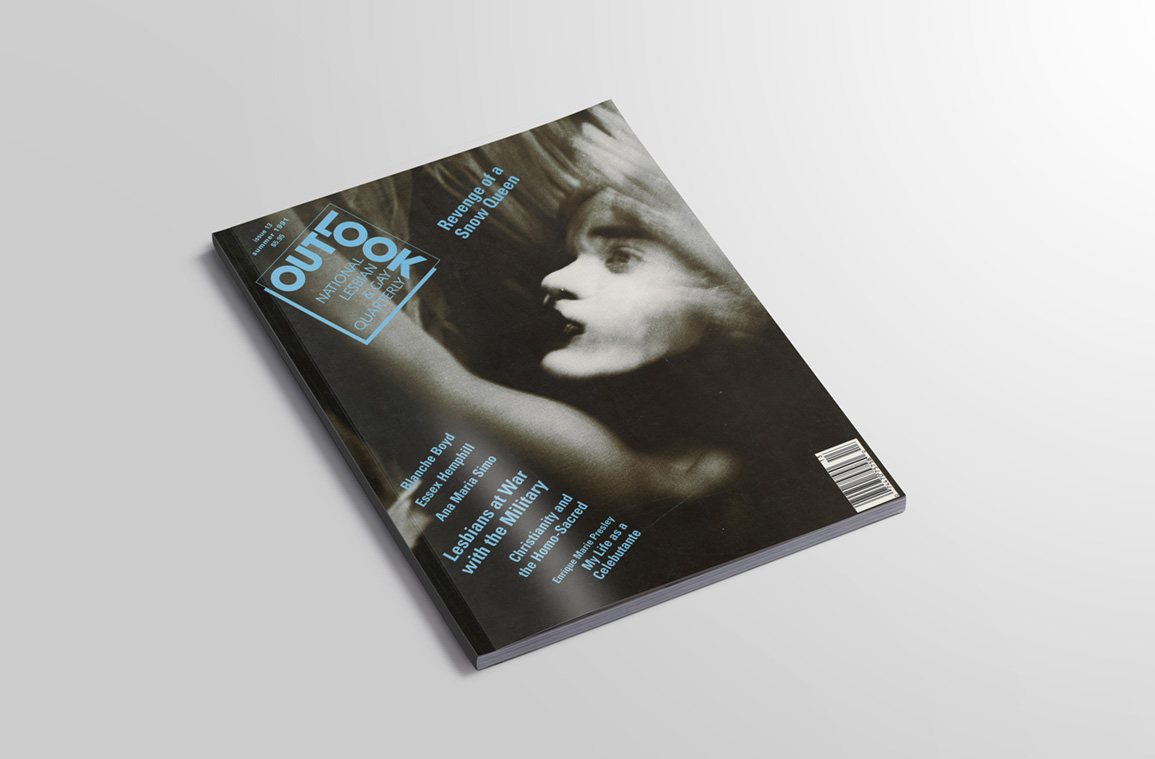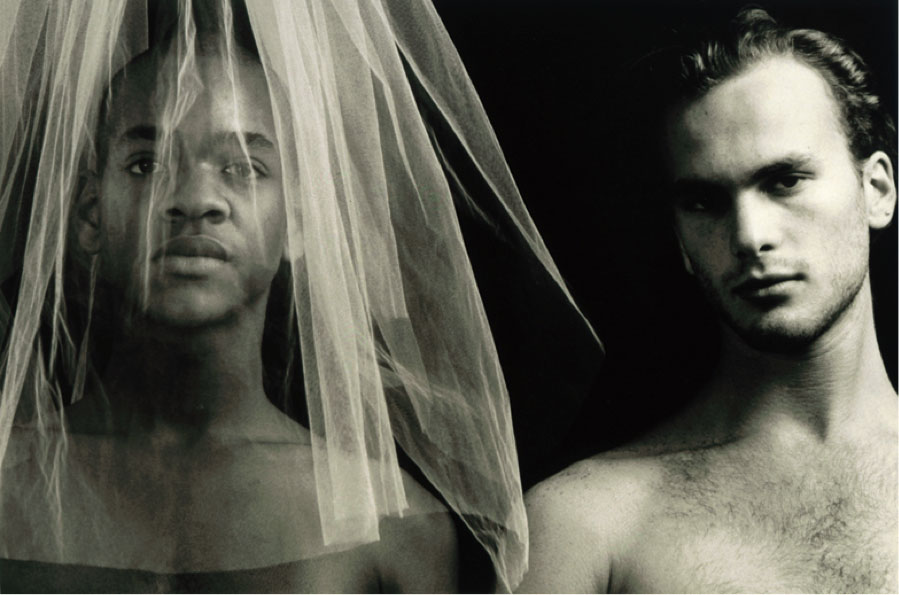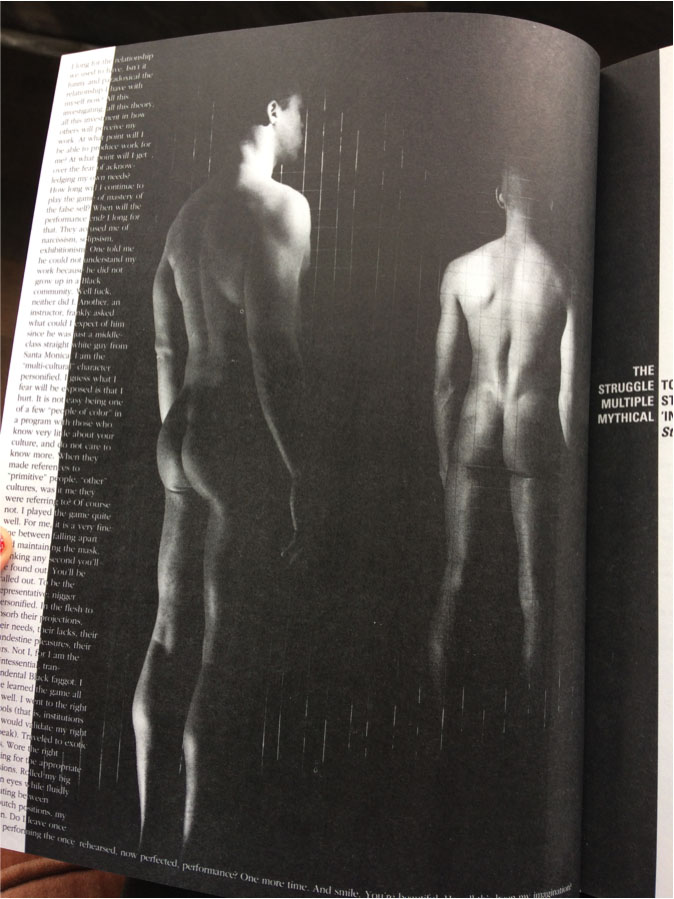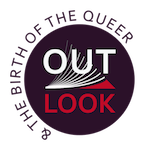
This piece was triggered by some of the direct quotes in the OUT/LOOK dossier “Lesbians at War with the Military” and the general issues raised by that collection. Some quotations from the Ana Maria Simo piece “Infernal Twins” on arts funding are inspiring in terms of what I hope the piece will do, how it will invite people in, and what role I’d like it to play in the world. I loved the dodie bellamy piece and Blanche Boyd story about the lesbian relationship with rocks and a shaman. I am also inspired by a couple of the pictures in Lyle Ashton Harris’ portfolio in the magazine, especially that picture of him with the tule like a veil over his head with the white guy and their eye contact with the camera and the vertical picture of him walking up the hill in the landscape with the tule around his waist and that quote about constantly creating oneself from Fanon. These are the things that I’m thinking about in the piece. I am still trying to figure out the spiritual component because I felt that was so strong in the issue and in a way that was shocking to me as someone who rarely hears queer people trying to find their place in Christianity.
Soldier — a woman, young, Black, a soldier in the U.S. Army
Officer — a woman, older than Soldier, Sergeant of Soldier’s unit
Lover — a woman, Soldier’s lover
Setting:
The war at home.
Time:
During the first gulf war.
Officer and Soldier.
Soldier:
What’s that sound?
Officer:
The mourning dove.
(The sound is hollow, yearning, full of a fundamental internal emptiness, so familiar on earth, perhaps it is our stomach, our resonating cavities that allow us to sing, but we would like them all filled up. We imagine success like this.)
Soldier:
I heard that last night too. In the morning and in the night, same sound. Somehow it fits with both.
Officer:
That’s its call. Whenever it wants to make a sound, that’s what it sounds like. They make it mostly when they’re alone.
Soldier:
It sounds sad.
Officer:
It comforts me. I’ve moved different places. But wherever I go, I hear that sound, and I know I’m home.
Soldier:
This is the most home I’ve ever felt.
Officer:
You’ll be a good soldier.
Soldier:
(Home never felt like home, was home, but didn’t feel like it, I wanted to go home, but I was here already.)
It’s like I had to come halfway across the country to understand I have somewhere that’s mine to fight for. But I don’t think it’s the country. It’s here. Something about here, being part of the unit, fighting for something bigger.
Officer:
Feeling that way helps. But you’re young. This won’t be your only home.
Soldier:
I want to go to college. I could do that.
Officer:
That’s a good thing to do after service.
Soldier:
I don’t miss anything from home. Hardly anything.
Officer:
Many soldiers become themselves here.
Soldier:
Be all you can be, right?
Officer:
Yes. But it can be hard.
Soldier:
I don’t mind hard. I do what I have to.
Military Chapel. The Soldier is praying.
Soldier:
I cut something off to be here. I don’t really know what it was, but it was. And I feel it cut off…missing. God, please let it be there when I’m through with this. Let me still be here. Let me make it to college.
The Soldier and her lover.
Lover:
You don’t come to see me anymore.
Soldier:
I come to see you.
Lover:
Not as much.
Soldier:
I’m here now.
Lover:
There’s something happening in you. Your mind’s on something.
Soldier:
Lover:
Did you kill someone or something?
Soldier:
No. We don’t even do that. My unit doesn’t even do that. What do you think? We haven’t even deployed.
Lover:
Don’t kill anyone. I don’t want you to.
Soldier:
You’re being dramatic. I’ll follow orders. I’ll do what we’re there to do. Then I’ll come back.
Lover:
You seem like you’re already gone.
Soldier:
Lover:
Where are you?
Soldier:
Some guys are giving me shit. They found out I’m seeing someone. It’s not a big deal. I dealt with it.
Lover:
How?
Soldier:
What?
Lover:
How? How’d you deal with it?
Soldier:
I just did. I think we need to cool it a little. I don’t want to lose my job.
Lover:
Just tell them I’m a man.
Soldier:
You’re not a man.
Lover:
Being a lesbian isn’t as bad as dying.
Soldier:
Lover:
Sorry.
Soldier:
I don’t think we should see each other for a while.
The Soldier alone.
Soldier:
I was fighting for freedom, I thought. Maybe that’s stupid. That’s what they tell you. The country protects you. You protect the country. It’s noble. You get a pension, benefits, scholarship. You’re a fucking noble human being who can support a family. But I don’t feel like that. I feel like a piece of shit scraped of the bottom of the world, hanging by a thread.
The Soldier and her Lover.
Lover:
I saw a spider kiss its prey this morning.
Soldier:
That wasn’t a kiss.
Lover:
It wrapped it all up first.
Soldier:
Is that what you’re doing to me?
Lover:
I’m not gonna kill you, though. I’ll wrap you up real tight, so you can’t get away. I’m a spider that saves.
Soldier:
You’re gonna save me from my whole life, huh? What if I want it? The Army is my life.
Lover:
You love being caught.
Soldier:
No, I don’t. I don’t wanna be caught in anyone’s web. I should be telling you not to kill anyone. You’re gonna be the death of me before I do anything worth writing you from Iraq about.
Lover:
You’re a soldier. You can fight your way out of anything.
Soldier:
Soldiering’s just clothes. You take off my clothes. And what if I don’t want to fight?
Lover:
You still have to.
Soldier:
I know.
Officer and Soldier in an office.
Officer:
Are you a lesbian?
Soldier:
You know I’m a lesbian. I’m being blackmailed.
Officer:
I can’t help you.
Soldier:
I risked my life. I did fucked up things, but I had to. You’re seriously gonna discharge me because I’m a lesbian. Like that’s worse than what they did?
Officer:
It’s not up to me.
Soldier:
I guess it’s not up to you to prevent sexual intimidation and blackmail in your unit either.
Officer:
You made a choice not to come to me earlier.
Soldier:
I’m coming to you now, and you’re saying you’re going to kick me out of the army.
Officer:
Homosexuality is not acceptable. When it comes to the attention of officers, we have no choice but to report it and take action. Those men will be disciplined as well.
Soldier:
Say they made it up. I’m six months away.
Officer:
And how would that look? Me covering for you. There’s proof. You let them get proof.
Soldier:
I didn’t let anything. They’re criminals, rapists.
Officer:
How did they get proof?
Soldier:
They were my friends.
Officer:
You need new friends. It’ll be easier in civilian life.
Soldier:
I never had a civilian life. I came here to get one. I want a scholarship. I’m six months away. Please help me.
Officer:
You violated the Army policy you signed when you enlisted. Then gave your panties to those men who couldn’t give a shit about you. Why would they? No one wants to fight with a woman, let alone a lesbian, let alone a black lesbian. At least the straight women might sleep with them. But they figured out a way to get that from you too.
Soldier:
Fuck you. I trusted you.
Officer:
We trust each other with our lives, nothing else. War makes people go crazy. Your friends die. You see things, and you can never be a normal person again. And the only way any of us justify any of it is some bs rhetoric about what we’re all fighting for. The constitution, democracy, freedom, good old-fashioned American values. I never once heard of a lesbian included in any of those things, definitely not a black one, have you? Have you?
Soldier:
No.
Officer:
This is one of only places they’ll let us make a career because we might die doing it. And it’s worth it to us to risk our lives just to feel like a part of this fucking country. But it doesn’t always work out that way, does it?
I’m sorry I wasn’t there when you signed your enlistment papers. If I had been, I would’ve let you sign them anyway because I wanted you to win. I was hoping things would be a little bit better by now. That was a miscalculation. I’m sorry, Private.
Soldier:
I was a good soldier. The best.
Officer:
You were good. The best soldiers don’t have to lie.
Soldier:
You lie all the time.
Officer:
Soldier:
Dishonorable. The fuck am I going to do now?
Officer:
Go to college.
Soldier:
This was my plan. I already cut off a part of my damned self to be here.
Officer:
Where did you grow up expecting you wouldn’t have to cut a piece of you out to be anywhere, Soldier?
Soldier:
That’s the problem with your generation. You guys cut yourselves to horsemeat just so you wouldn’t have to feel them doing it to you. I refuse that. If they want to come for me, let them come. I won’t do their violence for them. It’s 1991. I wanna be fucking free. That’s what I was always fighting for. And if you want to be a rape apologist who calls your girlfriend your roommate maybe I should be happy to be “less than honorably” discharged from wherever you are.
Officer punches Soldier.
Soldier:
Excuse me for thinking that we were included in whatever this is all for.
Soldier exits. Officer is shaking.
The Soldier alone.
Soldier:
Last time I felt free was in church. Well, it was a mosque, but it felt like church. We were in the desert. The town we were stationed in had a beautiful old mosque. The sun was coming in. I looked up and closed my eyes. I needed God then. My soul felt full of holes, like a sieve. But then God blew right through and stayed there. I felt like I belonged. I thought, something brought me here to this church to meet God. Some grace in the form of the U.S. Army or in spite of it. I had been a Christian, but I never felt God like that. Never knew in my body that I was part of him. That he was me. I knew I was okay then. That night I slept like I had no nerves, even though we were in war, I was only faith.
Soldier and her Lover.
Soldier:
Listen.
Lover:
What’s that?
Soldier:
Mourning dove.
(Never was home, never could be home, never knew home, but found home anyway.)
Lover:
It’s sad.
Soldier:
They’re alone. They’re calling for someone, but it’s like they already know they’re not gonna come.
Lover:
Maybe they’re not calling at all. Maybe they’re just saying how they feel.
Soldier:
Maybe.
Maybe they’re reminding us that it’s okay to mourn everything that’s happened here.
Lover:
I’m not mourning. My love came home.
End of Play.
Maybe “The Queen and The Soldier” by Marlene Vega plays.

A veil.
“Lyle” in the picture:
Does a veil make a marriage? Or do my eyes? Available, future-seeing, looking past you. My chin, so ready for some moment after this it may take flight. The emptiness of a neck when one is silent. My clavicle, beautiful, an opening that starts and stops the world.
We have already made the marriage. Now we look at what we are married to. I look at you (not much). A husband makes a body pop.
“Lyle” in the picture:
I look into the picture not the camera. The point of a picture, like a marriage, is to catch. Is it me or you caught?
I catch myself being some part of me in a marriage (just a part). I catch myself to catch you. I see the veil between us, and I see through it.
You I are caught.
What will become of this marriage?
“David” in the picture:
I deploy my neck in an attitude. Before you have even spoken, I defend myself with the cock of my neck.
“Lyle” in the picture:
I deploy my neck for vulnerability. I deploy my neck for strength. In photography, as in life, they are synonyms.
“David” and “Lyle” in the picture:
I deploy my neck for dignity, arrogance.
“David” in the picture:
You think it’s just my eyes, but my earring stares too. A tiny echo.
Crinoline:
A dress is a window. It frames what’s beyond itself.
“Lyle” in the picture:
A veil is a private opening. An opening to privacy.
“Lyle”:
You don’t know me, but through my pictures you do. I show up in a mazagine laying open on your bed. I catch myself, so I don’t have to be there when you see. Though sometimes I like to be. You see my longing. I show you me longing to mark what is absent. I show you me longing to create what I have found absent in art. I am of myself. I long for myself. I can see you looking. I deploy your gaze sincerely.
I veil myself in honor of deciding who and what to marry.
I project myself into a future that can meet my wholeness whole.
“David”:
I am hiding. My jaw is wired shut. I have not considered marriage and yet I am followed by its image. I have no parents. I created my chest hair myself.
“David’s” chest hair:
Ah ahah ahah ahah
“Lyle”:
If standing behind a curtain makes one a wife, I am a wife. If considering the privacy and publicness of a veil makes one a wife, I am one. If watching oneself and taking pictures makes one a wife…yes, I do that.
Like any wife, I have dreams.
“David”:
I’ll never be a husband. I’m just standing here. Husband is hinted by the photographer.
“Lyle”:
Me.
“David”:
Projected onto me by you, knowing what you know, seeing what you see perhaps many years later, after we have seen more images of husbands and husbands. I’m always in the picture. Whether I’m in the frame or not. My white, youthful arrogance staring back at you from 1988.
Crinoline:
But I’m just a window masquerading as a veil.
“Lyle”:
I make the frame.
“Lyle”:
I make him a husband just for the moment. I often appear alone. Like any wife.
Like any wife, I have dreams. I make you a spectator. My dreams include a space that comes in around me like an embrace you fall into, swim into. Space so completely itself, incomplete without me, that it welcomes me in as part of it. Space unlike a grid, but I show you that anyway, so you can see what we do, you and I. My dreams include congress with the divine. Freedom embodied. A vision of god in my image. When you have been put in the position of a bride without really wanting that, wanting to be that, you were just standing under a window somewhere. Something falls in front of your face that puts you in a private room of seeing, still seen, but through a veil. Who are you to ask no questions? Take no pictures?

I am going somewhere. I go by standing here. I place us on either side of the grid I know to be there. I go on standing there, taking a picture. So you have to see it. I don’t even have to be there. I can’t be there actually. I made up that uninhabitable place and gave it to all of us to see. After I give things to us, I go back home. Sometimes I go out with friends. Or my boyfriend. Sometimes I feed a cat I see around the neighborhood. I walk in the sun and wind. I see myself. I am. I take pictures. I do. There it is. I am young and this is an offering to us. My skirt, once a veil, blows in the wind. I am in the landscape. I walk uphill, but the landscape is beautiful, holds me. I could see, years later, and say, my pictures were lovely, lonely. My cat doesn’t notice anything. She knows marriage by being, not by seeing.


